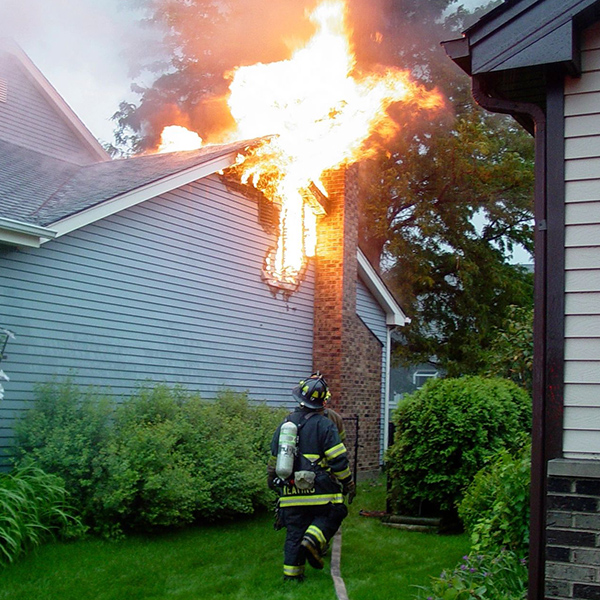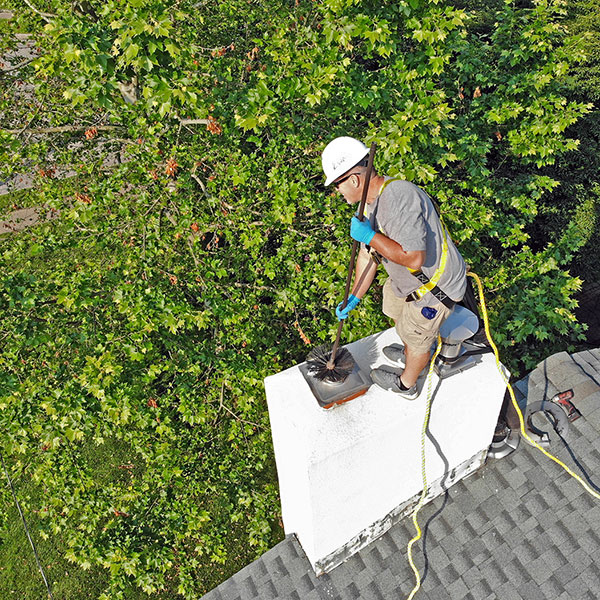What to Do When Lightning Strikes Your Chimney
Your chimney is exposed to the weather 24/7, including rain, wind, snow, ice, and lighting. When thunderstorms roll in, the chances of a lightning strike within a 25-mile radius increase. The intense heat from a lightning strike can reach up to 50,000° F. Lightning strikes are estimated to cause approximately $900 million in damages annually. This post explores the steps you should take after lighting strikes your chimney to ensure safety.
 Dangers of Lightning Strikes on a Chimney
Dangers of Lightning Strikes on a Chimney
Chimney Fires
The greatest risk of a lightning strike on a chimney is fire. The intense energy generated by the lightning bolt can ignite anything combustible. The National Fire Protection Agency reports that lightning fires occur in homes one out of every five times. While brick isn’t combustible, the creosote that builds up in the chimney is.
Masonry Damage
Besides chimney fires, lightning strikes can also cause significant masonry damage. Lightning, heavy winds, and rain can crack masonry materials, leading to waterdamage, deterioration, and collapse.
How to Detect Lightning Damage
After a thunderstorm, inspecting the chimney for signs of damage is wise. Early detection can prevent further damage and deadly situations like a fire. Here are the most common signs lighting has struck your chimney.
Masonry Debris
Check the ground beneath the chimney for bits of masonry, which could result from a lightning strike.
Cracked Crown
The intense heat and force from a lightning strike can crack the crown, allowing water to seep in, leading to further deterioration.
Water Leaks
If you notice increased moisture, stains, or mold on the inside chimney walls, it could be due to cracks caused by a lightning strike. To ensure your chimney is safe, call a certified chimney professional for an inspection. Licensed professionals have the training to detect damage that the average homeowner might miss, which could save your home from a deadly fire.
What to do After a Lightning Strike
Keep Safe
As mentioned, lightning strikes generate intense heat. If you smell smoke after a strike,
evacuate the home immediately and call emergency services. Chimney fires are hazardous and can quickly spread to the roof and the rest of the house.
Schedule an Inspection
Whether your chimney got struck by lightning or not, it’s a good idea to schedule an inspection from a chimney professional after a violent storm. High winds can cause debris to strike the chimney and cause damage.
Repair and Restoration
If lightning damaged the chimney, you must repair it as soon as possible. Repairs may include:
- Masonry Repairs
- Chimney Crown Repair or Replacement
- Flue Liner Repair
- Waterproofing
A damaged chimney is unsafe to operate, so you must fix it before using it again.
How to Prevent Lightning Strikes
Once you’ve repaired your chimney, consider taking preventative measures to prevent further damage, including:
Installing a Lightning Rod
Installing a lightning rod on the chimney can provide a path for lightning to discharge safely, reducing the likelihood of chimney damage.
 Trim Nearby Trees
Trim Nearby Trees
Trim trees and branches close to your chimney to prevent them from becoming conductors for lightning strikes.
Regular Maintenance
Schedule regular maintenance, inspections, and cleaning to identify issues that could put you at risk of a fire.
The bottom line is that if your chimney is struck by lightning, it’s essential to take immediate action to have it inspected and repaired if necessary. Lightning is extremely dangerous and can cause chimney fires and masonry damage, including water leaks.
Call the Pros at Mercer County Chimney Service, the number one chimney and fireplace contractor in Hamilton, NJ, and Mercer County. We offer complete service, from cleanings, inspections, rebuilding, maintenance, and more. Our technicians are certified by the Chimney Safety Institute of America and the National Fireplace Institute, so that you can trust their work is done to the highest standards. Call us today to book an appointment at 609-802-5288.



